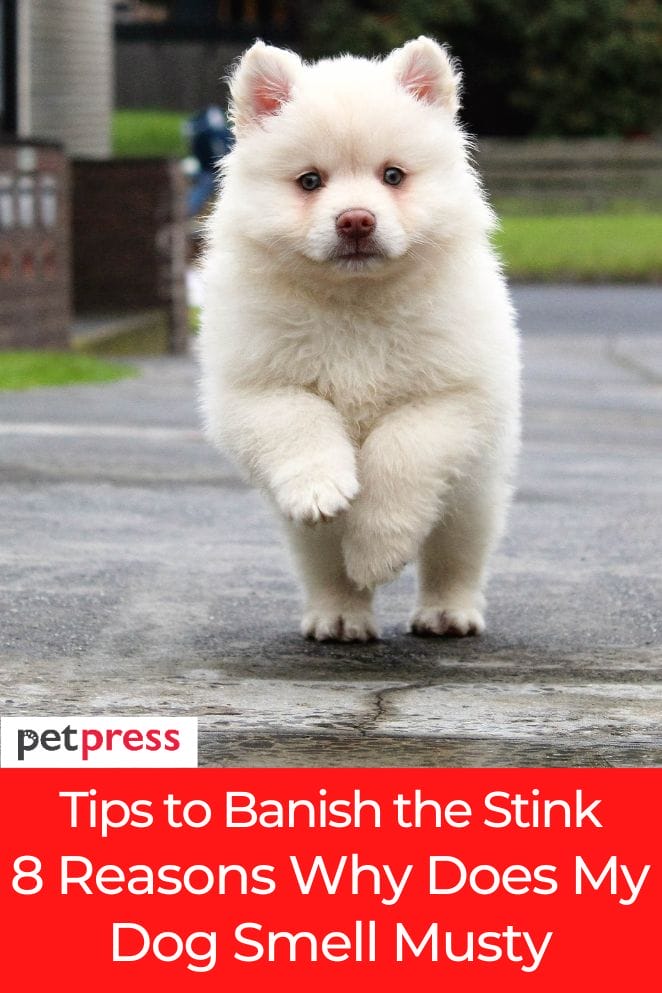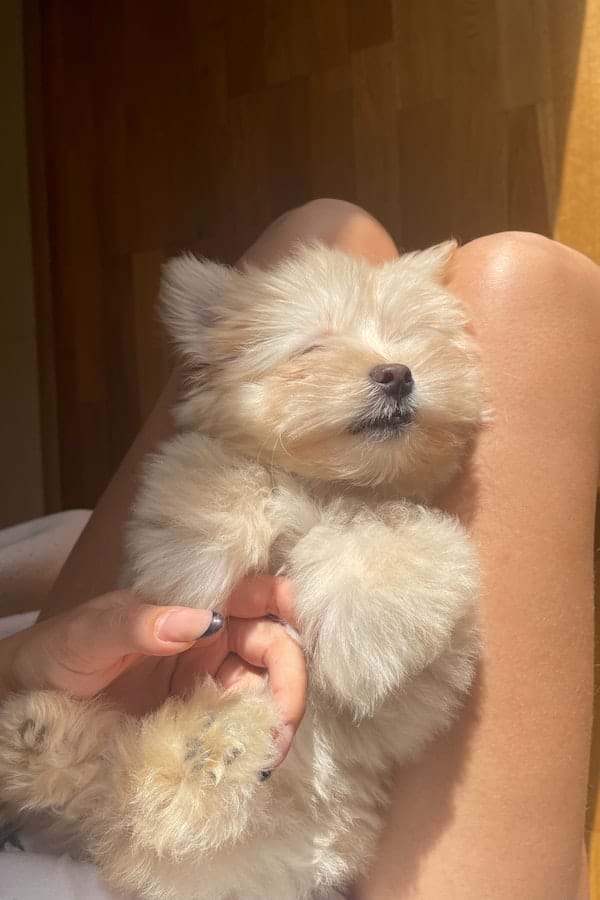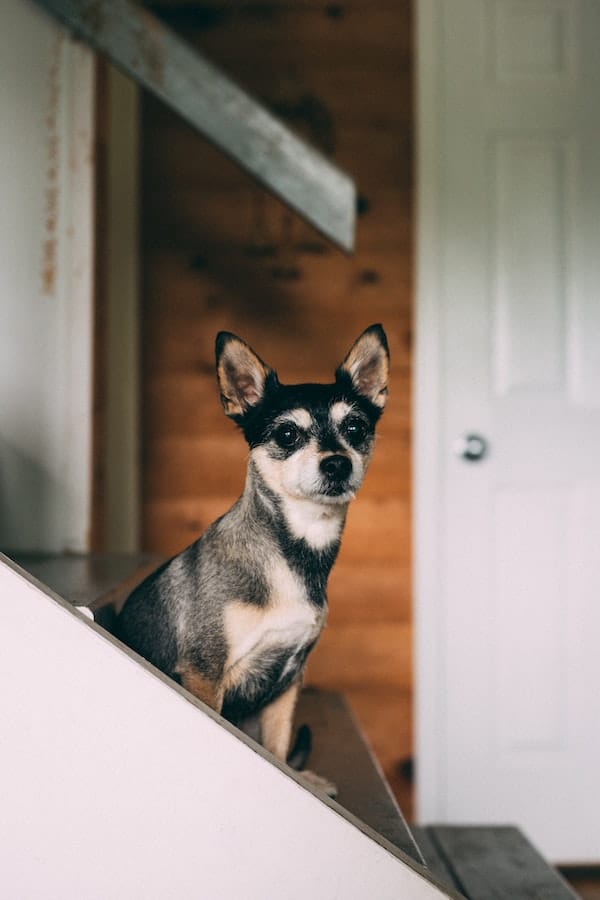
Have you at any point inclined to give your fuzzy companion a warm, loving nestle, just to be welcomed by an undesirable, stale-smelling scent?
Assuming that you have, you’re absolutely not the only one. It’s a common concern among dog owners – that lingering musty smell.
But fret not, because there are multiple factors that contribute to this odor, and the even better news is that there are practical solutions to bid it farewell.
In this article, we’ll delve into the reasons behind that musty scent and equip you with effective strategies to ensure your four-legged companion always exudes a fresh and clean aroma.
Why Dogs Smell Musty
Dogs can develop a musty odor for various reasons, and understanding these causes is the first step in tackling the issue.
Skin infections
One possible reason behind that noticeable musty scent in your dog could indeed be a skin infection.
These infections typically stem from a range of factors, including allergies, mites, or an overgrowth of fungal elements.
It’s crucial to stay vigilant for signs such as your dog excessively scratching or licking themselves, as these actions can be indicative of an underlying skin problem.
Allergies, for instance, might be set off by various triggers like certain foods, environmental elements such as pollen, or contact with allergens.
When your dog’s system reacts to these triggers, it can lead to skin inflammation and infection, ultimately contributing to the rather unpleasant odor you’ve detected.
Poor grooming habits
Regular grooming is crucial for dogs, and neglecting this aspect of their care can result in a musty smell.
Dogs accumulate dirt, debris, and excess oils on their fur, particularly those with thick coats or long hair.
When this buildup is left unchecked, it not only contributes to the odor but can also lead to matting and skin problems.
Proper brushing and bathing are essential to keep their coat clean and healthy.
Breed-specific factors
When it comes to the distinct aroma of our canine companions, it’s worth noting that some dog breeds are more inclined to carry a musty scent due to their inherent characteristics.
Breeds such as Bulldogs or Shar-Peis, with their pronounced skin folds, are particularly susceptible to developing this odor.
The reason lies in the fact that these deep skin creases can trap moisture and bacteria, creating an environment conducive to skin infections and, subsequently, the associated unpleasant smell.
Moreover, certain breeds possess naturally oilier skin, which can intensify the odor if not managed correctly.

Ear infections
You know, it’s funny how easily we overlook ear infections as a potential source of that rather unpleasant musty scent in our beloved furry companions.
These pesky infections tend to sneak up more often than we’d like, particularly among dogs with droopy ears or a knack for allergies.
Once these ear infections take hold, they can kickstart the production of a rather unsavory discharge – talk about a stinker!
What’s worse, this discharge doesn’t just stop at the ears; it’s got a talent for spreading to other parts of your dog’s body, amping up that odor to new levels of unpleasantness.
Dietary factors
You know, it’s quite astonishing, but your dog’s diet has a far-reaching impact on their overall scent.
It’s not something we often connect, but here’s the scoop: the quality of the food they munch on and any lurking food allergies can play a pivotal role in stirring up some rather unsettling digestive dramas.
The result?
Breath that won’t win any awards, and an aroma that’s not exactly a bouquet of roses.
When your four-legged friend’s diet doesn’t tick all the right boxes – think top-notch ingredients and meet their specific nutritional needs – it can create a bit of turmoil in their tummy.
Anal gland issues
Dogs have anal glands that secrete a strong-smelling fluid.
These glands can sometimes become impacted or infected, leading to a particularly foul odor.
If you notice your dog scooting on the floor or excessively licking their hind end, it might be a sign of anal gland problems.
A veterinarian can help express or treat these glands to alleviate the odor and discomfort.
Dental disease
Don’t forget that bad breath can be a significant contributor to your dog’s overall smell.
Dental diseases, including plaque and tartar buildup, gum infections, and tooth decay, can result in foul breath that affects your dog’s entire demeanor.
Ignoring your canine’s dental cleanliness can prompt more serious dental issues and a steady-smelling scent.
Medications
Let’s not forget the impact of medications when it comes to your furry friend’s aroma.
It may surprise you, but certain medications, which are sometimes prescribed for your dog’s well-being, can introduce some changes in their body odor.
Antibiotics, in particular, have the potential to shake up the bacterial balance within your dog’s system, which might result in a somewhat peculiar scent.
If you happen to notice a notable shift in your dog’s smell soon after they start a new medication, it’s crucial to reach out to your trusty veterinarian.
They can help determine whether it’s merely a benign side effect or something that warrants closer attention.

How to Get Rid of a Musty Dog Smell
Now that we’ve explored why dogs can develop a musty odor, let’s dive into some practical solutions to banish that unpleasant smell and keep your furry friend fresh and clean:
Regular baths
Don’t underestimate the power of a good doggie bath when it comes to maintaining that fresh, musty-free scent.
The key here is to use a gentle, pup-approved shampoo that can work its magic in removing dirt, excess oils, and any lingering funky odors from your furry friend’s coat.
But, let’s tread lightly – there’s a balance to strike. Overdoing the baths can, surprisingly, backfire.
You see, too many baths can actually rob your dog’s skin of its precious natural oils, leading to dryness and potential skin woes.
The sweet spot for bath frequency can vary depending on your dog’s breed, activity levels, and those unique needs they might have.
Proper grooming
You know, there’s more to keeping your pup smelling fresh than just baths.
Regular grooming plays a crucial role in this game.
Take a good old brush, for instance – it’s your trusty sidekick in maintaining your dog’s cleanliness and keeping those odors at bay.
When you give your furry companion a good brushing session, you’re not just getting rid of those pesky loose hairs that act like dust magnets; you’re also helping to evenly spread those natural oils all over their coat.
This double-duty action not only keeps your dog’s fur healthy but also ensures it stays odor-free and pleasant for those cuddle sessions.
Healthy diet
A high-quality, balanced diet plays a significant role in your dog’s overall health and odor control.
Ensuring that your dog receives the right nutrients is essential.
If you suspect food allergies or digestive issues are contributing to their musty smell, consult your veterinarian for guidance.
They can recommend dietary changes or specific dog food brands tailored to your dog’s needs.
Adequate hydration is also crucial, as it helps maintain skin and coat health. Always provide fresh, clean water for your pet.
Regular vet check-ups
Routine visits to the veterinarian are essential for monitoring your dog’s health, including any potential sources of odors.
Your vet can identify and address issues like skin infections, dental problems, or dietary concerns that might be contributing to the smell.
They can also provide guidance on overall wellness and preventive care to keep your dog smelling fresh and feeling its best.
Environmental cleanliness
Don’t forget the importance of keeping your dog’s living environment clean.
Regularly wash their bedding, toys, and any areas they frequently occupy.
A clean living space reduces the chances of odors lingering in your home.
Ear care
Let’s chat about something super important – keeping your dog smelling fresh and in tip-top shape.
One key player in this game is proper ear care.
You see, regularly tending to your dog’s ears is like a secret weapon against unwanted odors and health issues.
It’s all about preventing the buildup of nasty stuff like dirt, wax, and other debris, which can sneakily lead to some rather unpleasant smells and even those pesky ear infections.
When it’s time for an ear-cleaning session, reach for a gentle, vet-approved ear cleaner designed specifically for dogs – trust me; it’s the way to go.

Anal gland expression
Anal gland issues are a potential culprit behind those less-than-pleasant odors in our canine companions.
You see, dogs have these glands, kind of like little pouches, on either side of their rear end.
Ordinarily, these glands release a teensy bit of fluid when your dog does their business.
But here’s the twist – sometimes these glands go a bit haywire.
They can get clogged up or infected, resulting in a rather potent and not-so-pleasant odor.
If your dog is grappling with these gland woes, you might notice them doing some rather peculiar things, like scooting their behind along the floor or excessively licking that area, all in an attempt to find some relief from the discomfort
Conclusion
Ultimately, let’s face it – none of us relishes the idea of snuggling up to a four-legged friend emitting that unmistakable musty aroma.
But here’s the silver lining: There’s a practical roadmap to tackle this olfactory challenge.
By gaining a firm grasp of what’s cooking behind those unpleasant scents and simply adhering to some straightforward advice on grooming, nutrition, and overall pet care, you can ensure your cherished canine companion remains a constant source of comfort and joy, sans any of those off-putting smells.
Happy snuggling!
FAQs
It’s best to use a shampoo specifically formulated for dogs, as human shampoos can irritate their skin.
The frequency of baths depends on your dog’s breed and activity level. Generally, bathing every 4-6 weeks is sufficient for most dogs.
If the odor persists, consult your vet to rule out any underlying health issues, such as skin infections or dietary problems.
Some natural remedies include using baking soda as a dry shampoo or adding apple cider vinegar to their bathwater. However, always consult your vet before trying new treatments.


GIPHY App Key not set. Please check settings